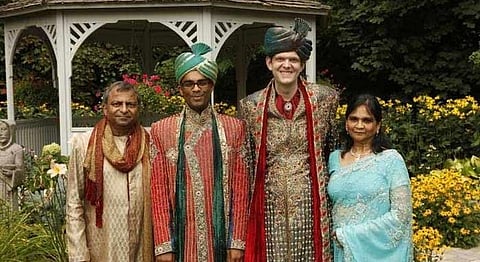
- HOMEGROWN WORLD
- #HGCREATORS
- #HGEXPLORE
- #HGVOICES
- #HGSHOP
- CAREERS
- ABOUT US
- CONTACT US

The most beautiful thing about this family’s breaking of conventions was their choice to look inwards and understand something they had no exposure to before they made rash, illogical decisions. Their son Rishi and his husband Daniel are luckier than so many other LGBT people out there.
In 2013, the infamous Ayurvedic yoga teacher, Baba Ramdev opened the gates of his ashram for India’s LGBTQ community with the promise that his yoga had the power to cure homosexuality. It’s hardly the first time someone proposed that they could pray away the gay, but such practices have been present throughout our history and continue to exist in the present. Moreover, there have been even less instances where friends, families, and communities have helped in opening the closets of acceptance and love for those who don’t identify as heterosexual in our rather narrow-minded Indian society.
Indian-Canadian couple Sushma and Vijay Agarwal, inhabitants of Ontario, Canada, had their fair share of difficulty in unlocking this very closet for their son Rishi. Although in April 2016, as the new founders of PFLAG (Parents and Friends of Lesbians and Gays) Peel for South Asians living in Brampton and Mississauga, they hit the kind of landmark that the Supreme court of India has failed to come even close to - they threw their son a big, fat Indian wedding - a day he thought he could never even dream off when he was still guarded about his sexuality.
“Like many parents, I and my husband expected both of our sons to grow up, marry a lovely girl, and raise a family. When our younger son told us in 2004 that he was gay, we were devastated. We wanted to know why this had happened to my family, who was to blame, and what we should do next?”, writes Sushma Agarwal honestly in her book ‘Loving My Gay Child: A Mother’s Journey To Acceptance.’ What could have followed was the risk of being disowned for Rishi but his parents decided that they would educate themselves about homosexuality. Yet instead of questioning their son’s confession that had been buried in the depths of his childhood, they decided to question their own upbringing - why had they not known about this same-sex love before?
“I was that ignorant,” said Sushma. “We as parents are worried about society, our friends and our family and what they are going to think of us but we never think what the child has gone through. We realized it was much more painful for the child.” As a form of second education, they began attending support groups and counseling sessions conducted by PFLAG in their neighborhood where they realised the same. Highlighting his and his wife’s difficulty of understanding his child, Vijay said, “At that time, we really needed the support because the thoughts were coming, why us? What did we do wrong? When we went to the first meeting, we felt – thank God we are not alone. There are others like us. This means it’s not that unnatural.”
Sushma also explains in her book that the baggage of this kind of intolerance is strictly what they had brought from India. Growing up in India, where the topic of sex itself is never spoken about, let alone same-sex relationships, they ended up with no knowledge of the LGBTQ community. But by watching films, interacting with other parents and a lot of soul searching, Rishi’s parents not only accepted him but even funded the dream of a lavish Hindu wedding he had always imagined in 2011. From having matching henna motifs on each other’s hands to turbans and sherwanis, Daniel and Rishi had all the essentials of a big, fat, Indian Hindu wedding and from the looks of it, they couldn’t have been happier about it.
Growing up in an Agarwal household, Rishi always had a strong bond with Hinduism. He explains that as a kid, when he was bullied for being different he used to run to the temple and break down into tears. Therefore, having the Hindu faith had always been a source of solace and home for all of his childhood struggles. It has been almost five years since the wedding in Canada and Sushma can still recount how fearful she was back then. In an interview with Hindustan Times, she says, “We were very happy with the wedding but fearful inside about how things are going to turn out. We were scared if people would come and create chaos.”
The fear was justified considering the procession of the wedding was denied by seven priests as it was a gay wedding. The stigma continues to prevail whether in India or abroad, no priest would like to carry out a wedding that is still supposedly believed unnatural in the eyes of Hinduism. But the irony of it all lies in the fact that while growing up, it was Rishi’s belief in this same religion that had guarded all his hope and light.
Although it cannot be denied that years and years worth of ignorance has ingrained a stigma against same-sex love between the walls of our traditional Indian households. Due to which Indian societies have guidelines that are to be followed for an idealistic family and norms that must be followed by each member. This does not only reinforce the stigma but dissolves the possibilities of such beautiful weddings, moments and relationships. But among all the closet doors that still remain shut -forcefully or in ignorance, the story of the Agarwals has definitely opened other doors of hope for other Indian families. We can only hope for the day stories like theirs become the norm rather than the exception.
